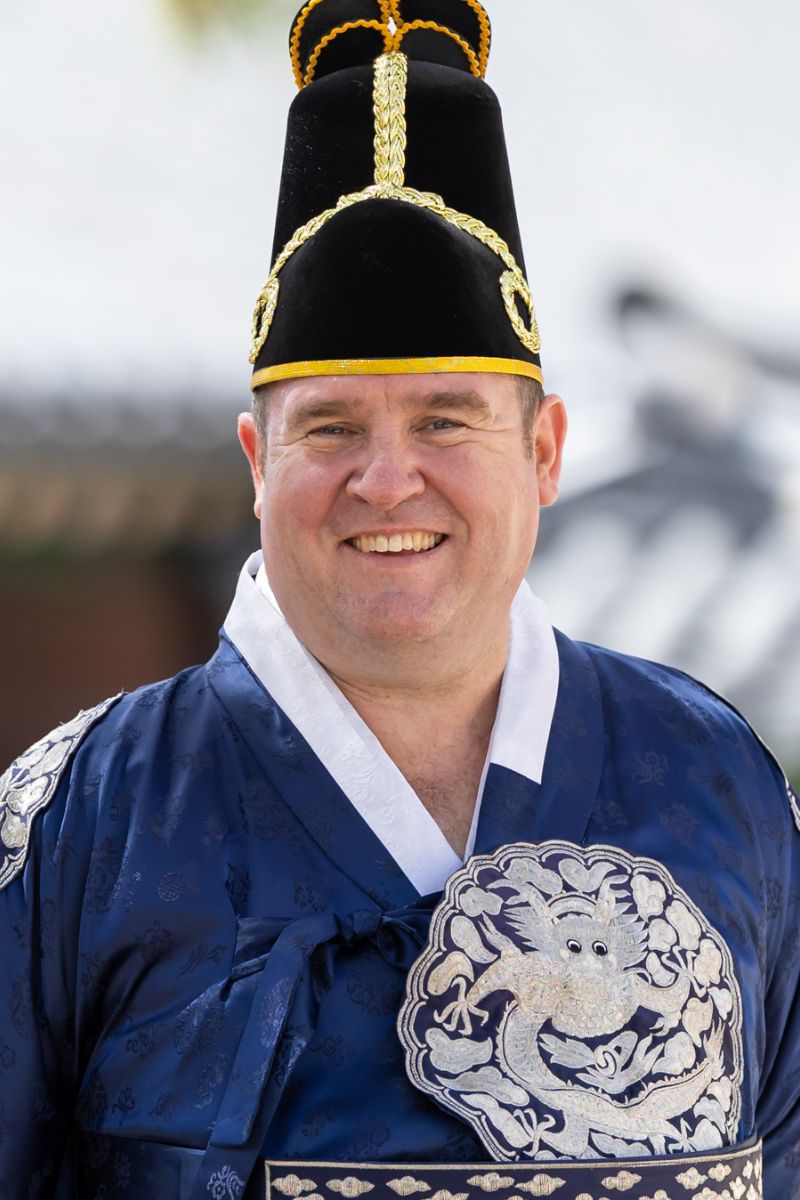Jeju Island attracts a massive number of tourists. In 2019, the island received 15.2 million tourists (of which 13.5 million were domestic travellers). With its combination of beaches, breathtaking natural landscapes, cultural heritage and great food, this is no surprise. Whatever your interests, Jeju Island has something for everyone.
Jeju Island’s popularity and diverse offerings make it hard to decide when to visit. Discover the best time to go to Jeju Island by learning about the weather, peak & off-peak seasons, recommended activities, and how they affect accommodation & transportation. This information will help you work out the best time to visit so you’ll be able to plan the perfect trip.
Don’t miss out on the opportunity to make your trip planning easy, hassle-free and organized. Click here to download your FREE printable checklist, to help you to plan your trip step by step and tick off items as you finalise your preparations.Join the South Korea Travel Planning Facebook Group
You are also welcome to join our South Korea Travel Planning Facebook Group – it is a great resource to enable you to ask questions about your upcoming trip to South Korea!
Disclaimer: This article contains affiliate links. If you book after clicking on one of these links then we may receive a small commission at no extra cost to you.
Why Tourists Love to Visit Jeju Island
Jeju Island is a volcanic island located off the southern coast of South Korea. It is the largest island in the country and is described as the Hawaii of South Korea.
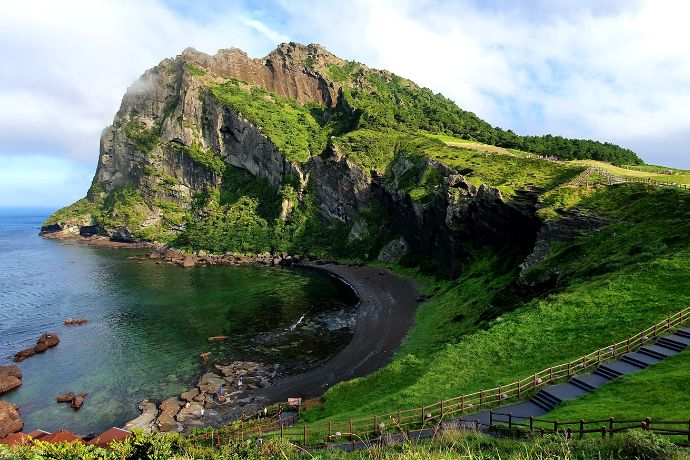
Tourist attractions on Jeju island are varied. It’s particularly known for its natural beauty with attractions such as Hallasan mountain (the highest mountain in South Korea), Seongsan Ilchulbong (a volcano crater that formed thousands of years ago), and the Jeju lava tubes (which are all UNESCO World Heritage sites). Jeju Island is also famous for its beaches, such as Hyeopjae Beach and Hamdeok Beach.
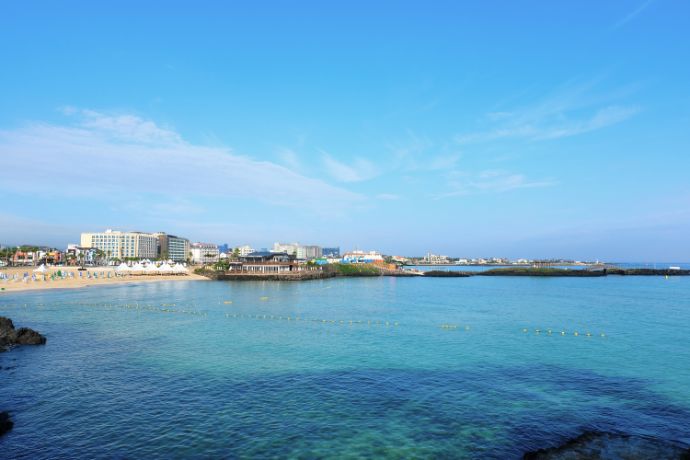
Jeju island is rich in culture and history, including museums and traditional villages. For foodies, the island is also well-known for its delicious cuisine, including seafood and black pork.
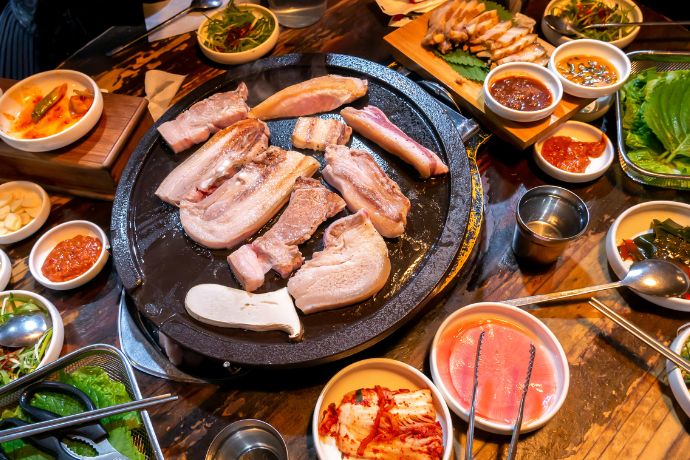
It’s particularly popular with domestic tourists as it’s a short one-hour flight from Seoul, making it both a great weekend or public holiday getaway as well as an excellent holiday option for longer holiday breaks. It continues to be a popular destination as tourism resumes post-COVID, with close to 14 million domestic tourists visiting there in 2022.
With so many natural, cultural and culinary attractions, Jeju Island is a must-see destination for any traveller looking for a diverse range of experiences in close proximity to each other.
Jeju Island Weather and Climate
One important factor when looking at the best time to visit is the weather on Jeju Island. It has a subtropical climate, with mild winters and warm summers. The island is located on the southern coast of South Korea and experiences a maritime climate, which means it receives plenty of rainfall and has high humidity.
The average temperature in Jeju Island ranges from mean high temperatures of 5°C (41°F) in January to mean high temperatures of 30°C (86°F) in August. June through September is when Jeju Island receives the most rain, including the possibility of typhoons which bring strong winds and heavy rain.
Spring (March-May) and Autumn (September-November) are considered the best time to visit, as the weather on Jeju Island is mild, and there is less rain compared to Summer. Summer (June-August) is usually hot and humid, and it is the peak season for tourists. During this period, the island is crowded, and accommodation tends to be more expensive.
Jeju Island in Winter (December-February) is relatively mild, but the island can be quite cold and windy. It can also snow in Winter, particularly on Mount Hallasan. During these months, the island may be less crowded, and you can find better deals on accommodation.
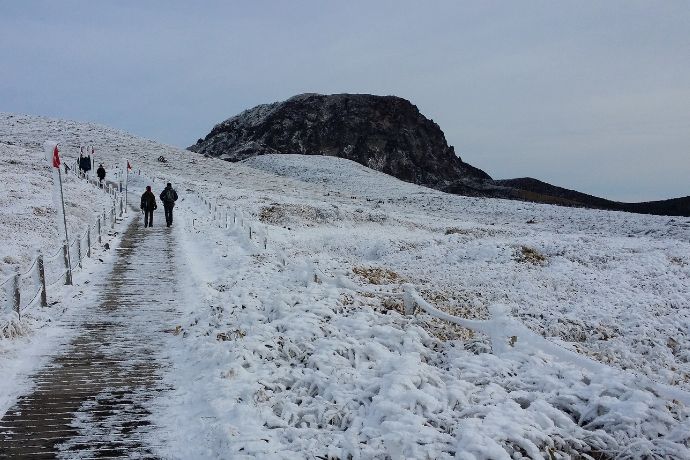
Overall, Jeju Island weather is mild, with moderate rainfall and high humidity throughout the year. If you want more detailed weather information, use Weatherspark and enter a particular location on Jeju Island (such as Jeju City). It’s definitely worth considering your personal weather preferences when working out the best time to visit Jeju Island.
Peak Tourist Season on Jeju Island
Peak seasons are typically when the weather is the most pleasant when domestic tourists take their holidays and when there are a number of popular events and festivals taking place.
The main peak tourist season on Jeju Island is during the summer, specifically June through August. This coincides with the Korean Summer break from mid-July to late August. During this time, the weather is warm and sunny. Many tourists (particularly domestic travellers) visit the island during this time to enjoy the beautiful beaches and landscapes. As a result, this time of year can be quite crowded, and accommodation and other tourism services may be more expensive.
Another more busy period is when Spring flowers are blooming. The island is famous for its stunning Spring flowers (including the beautiful yellow canola flowers and cherry blossoms. There are several flower festivals (such as the Jeju Canola Flower Festival and the Jeju Cherry Blossom Festival) taking place during this time, and it is a perfect time to see the island in full bloom. Autumn foliage season is also a peak season, and it’s a perfect time to hike the island, as the colours of the trees are beautiful.
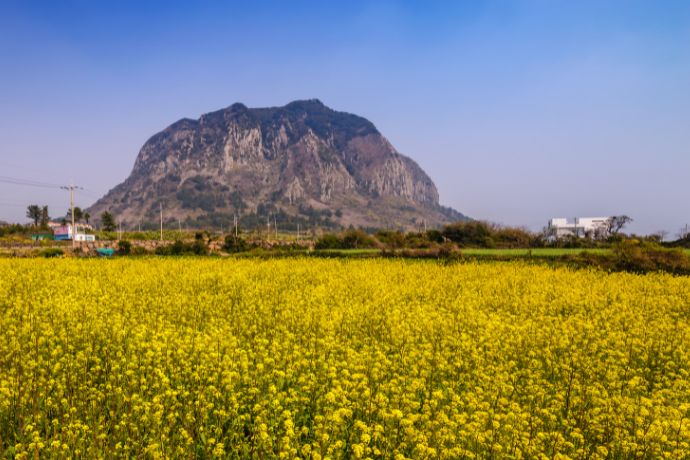
While peak seasons on Jeju Island offer a wide range of activities and experiences, they can also be quite crowded and expensive. If you’re looking for a more low-key or affordable experience, consider visiting the island during the off-peak season.
Shoulder and Off-Peak Tourist Season on Jeju Island
Shoulder seasons and off-peak seasons on Jeju Island refer to the times of the year when there are fewer tourists compared to the peak season. These seasons offer a different experience from the island during peak season and can be a great time to visit for those who want to avoid crowds and high prices.
Spring (March to May) and Autumn (September to November) are shoulder seasons, apart from when Spring flowers and Autumn foliage are at their peak. These seasons have milder weather, and the crowds will be less than in the peak season.
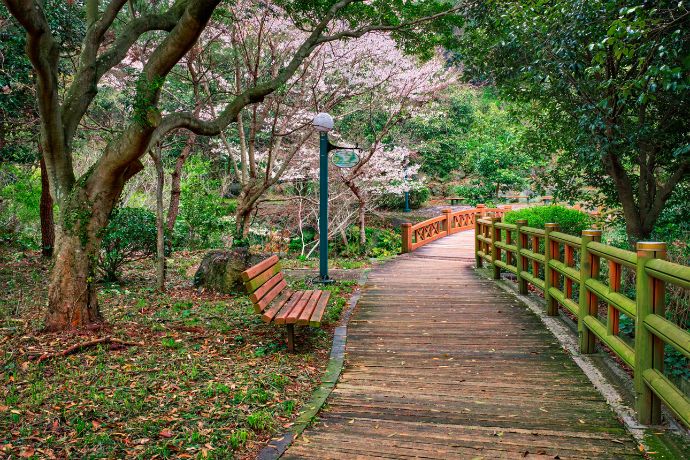
Winter (December-February) is considered an off-peak season on Jeju Island. The weather is relatively mild, and it’s less crowded than in peak season, but it is colder and windier. If you don’t mind the cold, this can be a great time to visit as the island can be quite peaceful, and the accommodation prices are lower. This is also a great time to pick and eat tangerines which are incredibly popular on Jeju Island. The picking season is roughly between October and March.
Benefits of Travelling to Jeju in the Shoulder and Off-Peak Seasons
There are many benefits to visiting Jeju Island during the off-peak season, including less crowded beaches and hiking trails, lower prices, and a chance to experience the island in a different way.
During the shoulder and off-peak seasons, it’s easier to book accommodation and some tourist activities. Keep in mind that some popular tourist destinations or activities may close or have limited hours during these seasons. The off-peak period also tends to be less expensive than the peak season. Accommodation, transportation, and activities are typically priced lower during these times, making it easier to stick to a budget.
One of the main benefits of visiting during off-peak or shoulder seasons is the ability to enjoy the island’s beaches and hiking trails with smaller crowds. During peak seasons, the beaches and hiking trails can be quite crowded, making it difficult to find a quiet spot to relax or take in the views. During the off-peak season, the crowds are smaller, and you’ll be able to enjoy the island’s natural beauty in a more peaceful way.
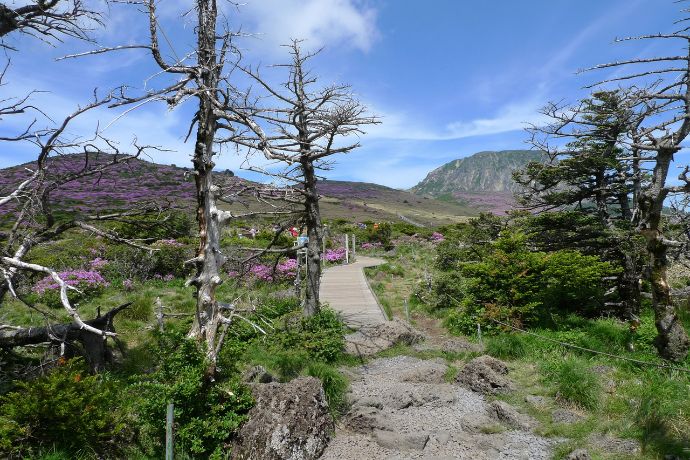
The off-peak season can also provide an opportunity to get a deeper understanding of the local culture and interact with the locals more. During peak season, the island is often overrun with tourists, making it difficult to interact with the local community. But during off-peak season, it is easier to visit local places and experience the everyday culture.
Travelling outside of peak tourist times comes with its own set of pros and cons, but if you’re looking for a more laid-back and budget-friendly trip, consider visiting Jeju Island during an off-peak or shoulder season.
Impact of the Tourist Seasons on Transport and Accommodation
Flying is the main way for tourists to get to Jeju Island. It’s the busiest domestic air route in the world, with 16 million available seats in a 12-month period. Flights to Jeju Island are available from several cities in South Korea. Ferries are also available to travel to Jeju Island from the mainland, and the prices vary depending on the time of the year.
Renting a car or scooter is a popular way to explore the island, as it allows you to visit remote places and have more flexibility. However, during the peak season, it can be difficult to rent a car or scooter because they are in high demand. Car and scooter rental prices also tend to be higher during peak seasons than during off-peak seasons.
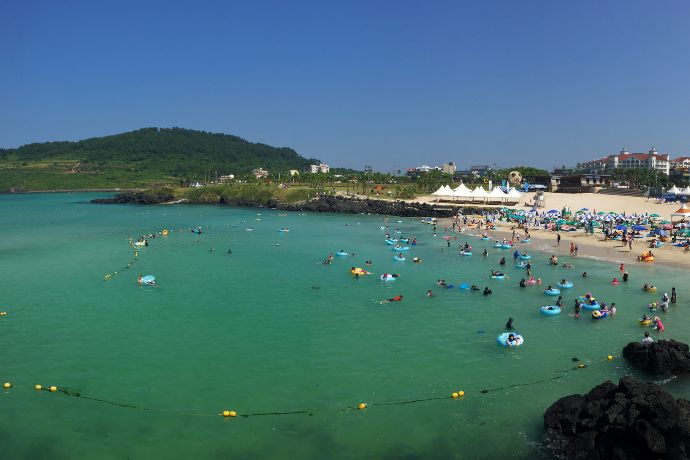
There are also buses and taxis available to get around the island, but they are not as convenient as a car or scooter. Additionally, there is a local intercity bus service that connects the main cities of Jeju Island and other areas.
Accommodation on Jeju Island ranges from luxury resorts to budget-friendly guesthouses. There are many hotels and resorts, and during peak seasons, these places tend to fill up quickly and may be more expensive. During off-peak seasons, it’s easier to find a room, and prices will be more affordable. Guesthouses and hostels are also popular and more affordable options but can be booked out during peak seasons.
Overall, transport and accommodation options are widely available on Jeju Island, but prices and availability can vary depending on the season. During peak periods, it can be more difficult to find accommodation and transportation, and prices will be higher. In these busy periods, plan ahead and make reservations in advance to ensure you have a place to stay and a way to get around during your trip. During off-peak periods, it’s easier to find a room and transportation, and prices will be more affordable.
Best Times to Visit Jeju Island by Activity
Jeju Island offers an incredibly wide range of activities for visitors, including hiking, water sports, and cultural experiences. Here’s an overview of some popular activities on Jeju Island and the best time of year to participate in each:
- Hiking – Jeju Island is known for its beautiful natural landscapes, including Hallasan mountain, which is the highest mountain in South Korea. The best time of year to go hiking is in the Spring and Autumn, as the weather is mild and the island’s cherry blossoms and Autumn foliage are in full bloom.
- Beaches – Jeju Island has many beautiful beaches, including Hyeopjae Beach, Hamdeok Beach, and Seongsan Ilchulbong Beach. The best time of year to visit the beaches is during the Summer, from June to August, when the weather is warm.
- Water sports – Jeju Island is a great place to enjoy water sports, such as swimming, snorkelling, and scuba diving. The best time of year for water sports is during the Summer, from June to August, when the water is warm.
- Cultural experiences – Jeju Island has a rich cultural heritage and is home to traditional villages and museums. These attractions can generally be enjoyed all year round.
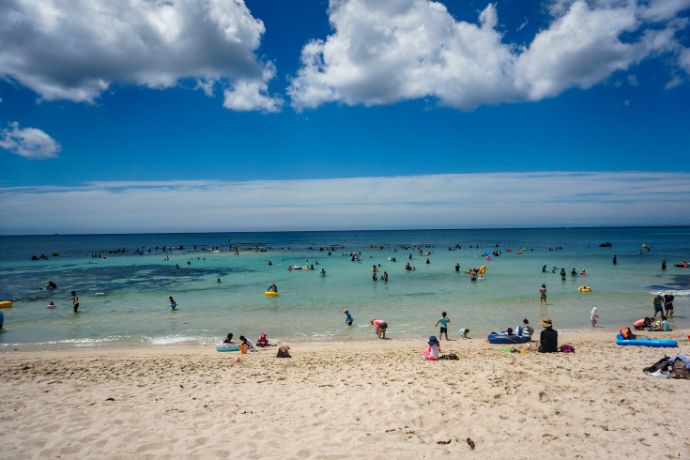
As you can see, depending on your preference, there’s no perfect time to visit Jeju Island as it offers different experiences depending on the season.
Summarising the best time to visit Jeju Island
Jeju Island is a popular tourist destination known for its beautiful beaches, stunning natural landscapes, great food and rich cultural heritage. The article looked at when is the best time to visit Jeju Island and discussed the weather and climate of Jeju Island, the peak and off-peak tourist seasons. It also looked at the implications of the tourist seasons on transport and accommodation.
The best time to visit Jeju Island depends on the type of experience you are looking for. If you’re looking for a warm and sunny vacation, the Summer months of June through August are the best time to visit. During this time, the island’s beaches and water sports are at their best. However, this is also the peak tourist season, so it can be crowded and more expensive.
Spring (March-May) and Autumn (September-November) are considered the shoulder seasons and are the best time to visit for milder weather, hiking and to see the island’s beautiful flowers or Autumn foliage. Winter (December-February) is considered the off-peak season, the island is less crowded, and the prices are lower.
When organising your trip to Jeju Island, consider the weather, the travel experiences you enjoy as well as your budget. Keep in mind that peak seasons tend to be more expensive and crowded, while off-peak and shoulder seasons can be more budget-friendly and offer a different, more peaceful experience. We recommend that you book transport and accommodation in advance, especially during peak periods. With planning, you’re sure to have a memorable and enjoyable trip to Jeju Island.

Join the South Korea Travel Planning Facebook Group
You are also welcome to join our South Korea Travel Planning Facebook Group – it is a great resource to enable you to ask questions about your upcoming trip to South Korea!
Disclaimer: This article contains affiliate links. If you book after clicking on one of these links then we may receive a small commission at no extra cost to you.
Tony Sutherland-Smith is an experienced travel writer with a profound affinity for Korean culture and history. His journey in travel writing spans many years, during which he has extensively explored South Korea’s urban and rural landscapes. His in-depth knowledge of Korea’s historical sites and his passion for modern Korean culture makes him a unique voice in travel writing.
As a key contributor to koreatravelplanning.com, Tony is recognized for his insightful and well-researched articles. His expertise is not just in narrating travel experiences but also in providing practical advice from his own travels across Korea. He is a respected figure among travel enthusiasts, often contributing to discussions and panels on Korean travel. Tony is committed to offering trustworthy and reliable travel advice. His writing reflects a blend of personal experience and meticulous research, ensuring that readers receive the most current and practical information. His dedication to authenticity and accuracy has established him as a trusted advisor in the realm of Korean travel.
Join Tony on his Korean travel adventures and gain valuable insights through his articles on koreatravelplanning.com. Follow him on social media for real-time updates and travel tips catering for both first-time visitors and seasoned travelers to Korea.


